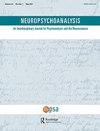Commentary on Solms’ “New Project”
Q3 Psychology
引用次数: 1
Abstract
Professor Solms has kindly invited me to comment on his newest manuscript. More than this he has generously, perhaps over generously, credited me with playing some part in sparking his initial intention to take Freud’s Project seriously as a result of some of my observations long ago. Like the State, the University insists on asking who you are before you are permitted to speak. In that case who you read is who you are and, in keeping with this belief, I may be permitted a few comments about who I was reading and otherwise occupied with in 1984 when a reserved young neuropsychologist audited some of my seminars. I found myself then in a strange position of offering something of my own interests and concerns in a segregated university standing on the brink of either the last civil war of the Cold War era or at the dawn of the first Mitterrand-Blair style neoliberal utopia in Africa. Many of my listeners were preparing for immigration and took a lively interest in the style of thought and topics they felt were relevant elsewhere. There was an expectation on me to provide introductions to what was then called Continental thought. I was trying to avoid making a salad of thinkers who I knew were very different to one another. Since I was due to teach under the rubric of comparative literature I decided to use the then-underexposed comparative work of Michel Serres to underpin a curriculum. It is at this moment that Mark Solms found me. My interest then was not really in psychoanalysis, although like most of my peers I had read and profited from Freud: at first Group Psychology and the Analysis of the Ego, The Interpretation of Dreams and Moses and Monotheism but beyond this assortment I had read Meltzer on transference, was intrigued by a Kleinian art writer Anton Ehrenzweig, and read whatever I could find in print by Adrian Stokes, but more for his vocabulary of the Renaissance than for his allusive treks through object relations. A chance discovery of Frank Sulloway’s large book opened a way to merge Freud with my abiding interest in scientific epistemology. Sulloway’s thesis that Freud was a crypto sociobiologist seemed a generous concession to Edward Wilson, but many great books had been written under the guidance of errors. I profited from Sulloway’s contention that two forms of explanation existed side-by-side in Freud, the distal and the proximal. This led to Sulloway’s emphasis on Freud’s unfinished “Project for a Scientific Psychology” as the outcome of his academic research career in neurology. In standard accounts, starting with Jones, this phase of Freud’s writing was retroactively packaged into a psychoanalytic sociology of ideas. In such accounts the Project came into existence but remained a torso as a consequence of its role in a relationship to a colleague and confidante Wilhelm Fliess. The potency of this view was maintained by the need to explain Freud’s self-analysis as a transferential construction, pursued in the guise of an unfinishable Helmholtzian mental automaton. Sulloway fortunately challenged this reception of Freud’s pre-psychoanalytic writing in a way that seemed to make them available to the kinds of analysis that Canguilhem had taught us applied to the life sciences and that Foucault had shown at work in the genesis of the human sciences, psychiatry and contemporary clinical pathology. Such were my actual interests but I had no wish to teach these things while I was working on them. I did have to teach an example of a genuinely comparativist and modern encyclopedist, however, and for a while I hovered between choosing Hegel or Serres as my baseline. Because I wanted an excuse to read Freud as an historical epistemologist, I chose Serres, who was the only figure in that tradition who seemed to be in a direct engagement with Freud. Foucault’s focus on sexuality seemed too broad and Lacan’s monumental reading relied little on Cavailles, Bachelard, or Canguilhem but instead on engagements with the giants; Plato, Descartes, Kant, Hegel, Heidegger, Sartre and twentieth-century linguistic formalists.索姆斯“新计划”评析
索尔姆斯教授恳请我对他的最新手稿发表评论。除此之外,他还慷慨地,也许过于慷慨地,称赞我在激发他最初认真对待弗洛伊德计划的意图方面发挥了一定作用,这是我很久以前的一些观察的结果。和州立大学一样,该大学坚持在你被允许发言之前询问你是谁。在这种情况下,你读到的就是你自己,为了保持这种信念,1984年,当一位保守的年轻神经心理学家审计了我的一些研讨会时,我可能会被允许对我读到的内容发表一些评论。当时,我发现自己处于一个奇怪的境地,在一所种族隔离的大学里,无论是处于冷战时期最后一场内战的边缘,还是在非洲第一个密特朗-布莱尔式的新自由主义乌托邦的黎明,我都会提供一些我自己的利益和担忧。我的许多听众都在为移民做准备,并对他们认为与其他地方相关的思想风格和话题产生了浓厚的兴趣。人们期望我介绍当时所谓的大陆思想。我试图避免让我知道彼此非常不同的思想家们参与进来。由于我将以比较文学为主题进行教学,我决定用米歇尔·塞雷斯当时曝光不足的比较作品来支撑课程。正是在这一刻,马克·索尔姆斯找到了我。当时我的兴趣并不是真正的精神分析,尽管和大多数同龄人一样,我读过弗洛伊德的书并从中受益:起初,《群体心理学与自我分析》、《梦与摩西的解释》和《一神论》,但除此之外,我读了梅尔策关于移情的书,阅读我能在阿德里安·斯托克斯的印刷品中找到的任何东西,但更多的是因为他对文艺复兴时期的词汇,而不是他对客体关系的暗示。弗兰克·苏洛维(Frank Sulloway)的大书的偶然发现,为我将弗洛伊德与我对科学认识论的持久兴趣结合起来开辟了一条道路。Sulloway关于弗洛伊德是一位加密社会生物学家的论点似乎是对Edward Wilson的慷慨让步,但许多伟大的书都是在错误的指导下写的。我从Sulloway的论点中获益,即弗洛伊德的解释有两种形式,远端和近端。这导致Sulloway强调弗洛伊德未完成的“科学心理学项目”是他神经病学学术研究生涯的成果。在标准的叙述中,从琼斯开始,弗洛伊德写作的这一阶段被追溯到精神分析的思想社会学中。在这样的叙述中,该项目成立了,但由于其在与同事兼密友威廉·弗利斯的关系中所扮演的角色,该项目仍然是一个躯干。这一观点的效力是因为需要将弗洛伊德的自我分析解释为一种转移结构,以一种无法完成的亥姆霍兹心理自动机的名义进行追求。幸运的是,Sulloway挑战了对弗洛伊德精神分析前作品的接受,这种接受方式似乎使它们可以用于Canguilhem教给我们的应用于生命科学的分析,以及福柯在人类科学、精神病学和当代临床病理学的起源中所表现出的分析。这是我的实际兴趣,但我不想在研究这些东西的时候教它们。然而,我确实不得不教一个真正的比较主义者和现代百科全书主义者的例子,有一段时间我在选择黑格尔或塞雷斯作为我的基线之间徘徊。因为我想找个借口把弗洛伊德作为一个历史认识论者来解读,所以我选择了塞雷斯,他是这个传统中唯一一个似乎与弗洛伊德有直接接触的人物。福柯对性的关注似乎过于宽泛,拉康的不朽阅读几乎不依赖于Cavailles、Bachelard或Canguilhem,而是依赖于与巨人的接触;柏拉图、笛卡尔、康德、黑格尔、海德格尔、萨特和二十世纪的语言形式主义者。
本文章由计算机程序翻译,如有差异,请以英文原文为准。
求助全文
约1分钟内获得全文
求助全文
来源期刊

Neuropsychoanalysis
Psychology-Neuropsychology and Physiological Psychology
CiteScore
2.50
自引率
0.00%
发文量
24
 求助内容:
求助内容: 应助结果提醒方式:
应助结果提醒方式:


